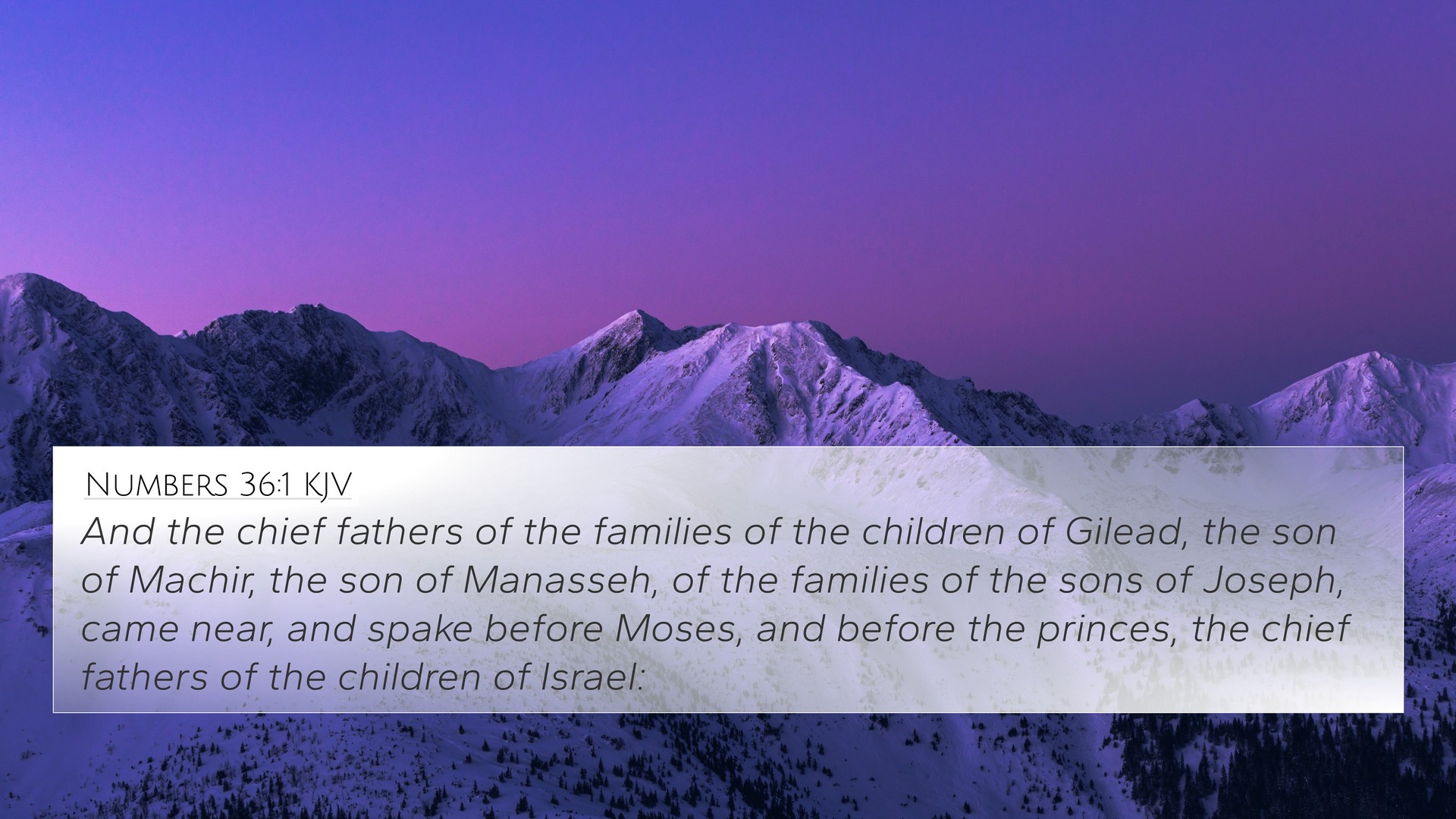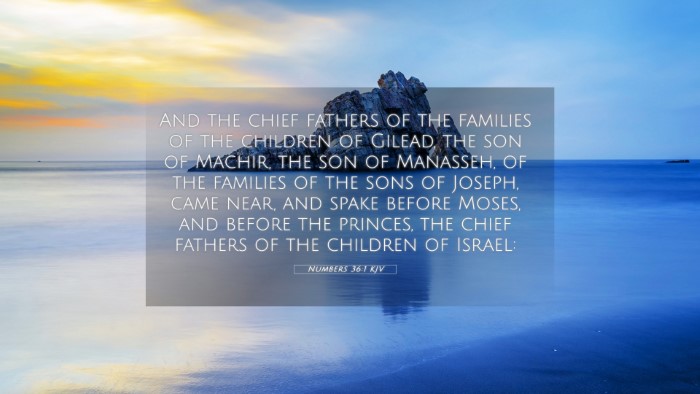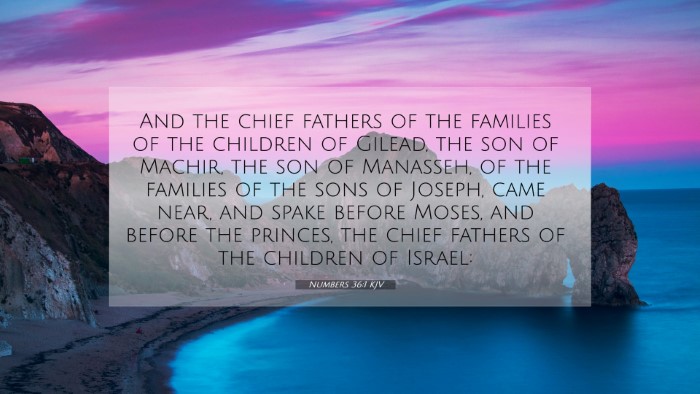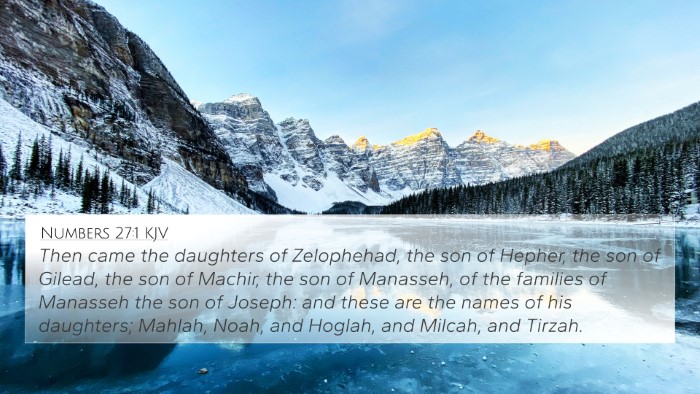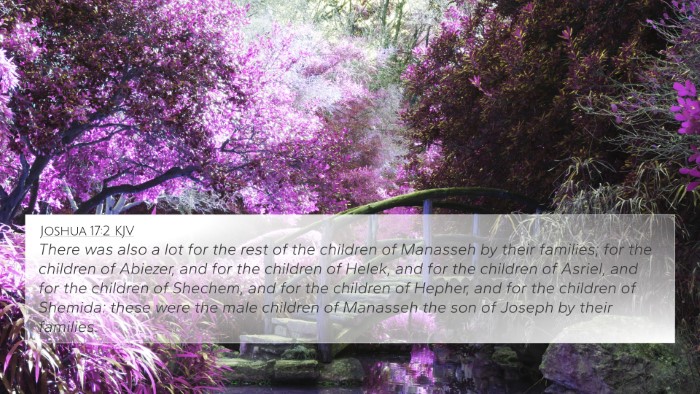Understanding Numbers 36:1
Numbers 36:1 features a significant discussion regarding inheritances among the Israelites, particularly the daughters of Zelophehad. This verse plays a crucial role in the broader context of God's laws concerning land ownership and family lineage as conveyed in the Torah.
Verse Context
In Numbers 36:1, the leaders of the family heads of the Gileadites came before Moses and the leaders to address an important issue regarding the inheritance that the daughters of Zelophehad had received. They were concerned that if the daughters married men from other tribes, their father's inheritance would be lost to another tribe and no longer belong to the tribe of Manasseh. This highlights the connection between family lineage and land ownership in ancient Israel.
Commentary Insights
- Matthew Henry: Henry emphasizes the importance of the request made by the leaders, indicating that this concern illustrates the diligence they had in protecting their inheritance. He points out the divine wisdom in protecting family lines and ensuring that inheritances remain within the tribes.
- Albert Barnes: Barnes remarks on how this situation represents a significant legal and social concern in Israelite society, reflecting the broader themes of justice and rightful ownership in the Mosaic Law. He notes the essential role of land possession among the Israelites and God's intention for their communal living.
- Adam Clarke: Clarke focuses on the cultural context of marriages during that time, explaining that inter-tribal marriages could disrupt inheritance laws. His commentary sheds light on the importance of maintaining social structures dictated by these laws.
Bible Cross-References
Understanding Numbers 36:1 is enhanced through various related verses that illustrate the concepts of inheritance, land, and tribe:
- Numbers 27:1-11: Discusses the inheritance rights of the daughters of Zelophehad.
- Deuteronomy 25:5-10: Covers the laws of levirate marriage and familial obligations.
- Joshua 17:3-6: Further elucidates the inheritance granted to the daughters of Zelophehad.
- 1 Chronicles 5:25-26: Highlights instances of tribal and familial dispersions.
- Ezra 2:61-63: Discusses genealogies and the issue of inheritance restoration post-exile.
- Matthew 5:5: "Blessed are the meek, for they shall inherit the earth," ties into the spiritual significance of meekness and rightful inheritance.
- Romans 8:17: Speaks of being heirs with Christ, connecting spiritual inheritance with the physical realities faced by the Israelites.
Thematic Connections
The verse not only highlights the physical inheritance but also draws parallels with spiritual inheritance themes that resonate throughout Scripture. This indicates that God's laws concerning physical inheritance are reflective of His greater plans for humanity's spiritual inheritance in Christ.
Application and Reflection
For modern readers, Numbers 36:1 invites reflection on the themes of justice, family obligations, and God’s provision. Its principles can parallel contemporary discussions around inheritance laws, familial responsibilities, and the value of community.
Using Tools for Bible Cross-Referencing
Engaging with this verse through Bible cross-reference guides and Bible concordances can deepen one’s understanding. It is beneficial to utilize comprehensive Bible reference resources to uncover connections and thematic elements across the scriptures.
Conclusion
Numbers 36:1 serves not only as a legal measure within Israel's history but also acts as a profound reminder of God's design for order, justice, and inheritance both in the material and spiritual realms. By cross-referencing this verse with others, readers can gain a fully rounded understanding of its significance and implications.
Further Exploration
To explore the interrelations of this and other scriptures, consider:
- How inheritance laws in the Old Testament relate to New Testament teachings.
- The connections between this verse and themes of justice and mercy found in the Gospels.
- Identifying practical applications of these ancient laws in contemporary Christian practice.
